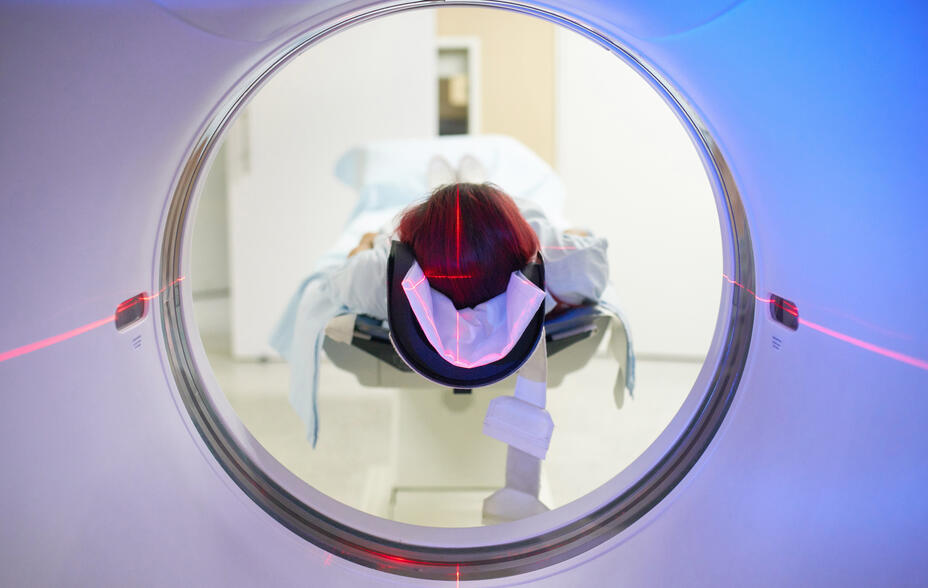
Investors should consider the investment objectives, risks, charges and expenses carefully before investing. This information and other information about the Funds can be found in the prospectus and summary prospectus. For a prospectus and summary prospectus, please visit our website at bailliegifford.com/usmutualfunds. Please carefully read the Fund's prospectus and related documents before investing. Securities are offered through Baillie Gifford Funds Services LLC, an affiliate of Baillie Gifford Overseas Ltd and a member of FINRA.
The recent rise of Chat GPT has thrust the notion of Artificial Intelligence (AI) into the centre of mainstream media and triggered a surge of investment in AI technologies. Baillie Gifford’s Health Innovation team is excited about the transformational potential that AI can bring to healthcare. It is an enabling technology that is already being used effectively across the spectrum of healthcare. From speeding up drug discovery to improving diagnostics and increasing the productivity of healthcare systems, AI is touching every aspect of healthcare and creating a new paradigm.
Healthcare: the perfect AI use case
Healthcare is, in many ways, the perfect AI use case. Thanks to the democratisation of technologies such as sequencing, imaging, wearables and sensors, the volume of healthcare data is exploding and eclipsing that of many other industries. The human body has about three billion DNA base pairs, 20,000 encoded proteins, and approximately 37 trillion cells. Understanding that level of complexity requires machine learning, as does exploring how the billions of possible chemical compounds in the universe interact with the body to find valuable drugs to treat its diseases.
While it is too early to forecast how radical and profound AI’s impact on healthcare will be, we can already see the early fruits of success in drug discovery and diagnostics. In the years to come, we will likely witness many examples of AI creating significant value for patients, healthcare systems and investors.
Here are some areas where we see the most significant potential for AI to improve human health, along with examples of companies leveraging AI to provide health solutions, while having the opportunity to generate attractive shareholder returns over the long term.
Drug discovery
Bringing a new drug through clinical trials to market today takes on average 10 years, costs over $1bn, and has less than a 10 per cent chance of success.
AI can deliver significant value by:
- reducing the time and cost of bringing a drug to market
- increasing its probability of success
- helping scientists to discover new biology and disease targets
AI enables scientists to screen for millions of drug compounds virtually before selecting only the most promising ones for testing in physical experiments. For example, US biotech company Relay Therapeutics is applying AI and computer modelling to find drugs for diseases such as cancer.

Using advanced techniques, Relay can screen millions of small chemical molecules in the virtual realm to find the best hits against specific disease targets. Without AI, the company would have to undertake lengthy manual tests, requiring a much longer lead time. In addition, its feedback loop can become increasingly fast as its proprietary data grows, giving it a competitive advantage over its peers.
AI can also increase the probability of success in bringing new drugs to market. It can analyse historical data to help predict which candidates are more likely to be successful and which are more likely to fail.
This helps companies optimise their drug molecules and let them ‘fail faster’ at an earlier development stage. That will mean companies won’t have to take a molecule all the way through to phase three, the final phase before the drug is licensed for use, only to realise at this late stage that it doesn’t work.
For example, US biotech firm Recursion is taking a novel approach to AI-enabled drug discovery. It takes high-resolution photos of miniaturised cell biology experiments and generates vast amounts of images showing how molecules interact with cell proteins, including healthy and diseased cells.
Recursion applies AI on top of this data and uses it to understand cell biology, discover new disease targets and screen for drug candidates. It is currently at the clinical stage, with several candidates in phase one and two development. We may now be on the cusp of seeing the potential of AI-enabled drug discovery transformed into actual drugs for patients.
AI and cancer
AI is a broad technology that can potentially transform many areas of healthcare, including cancer.
Many will be familiar with Moderna, following its successful Covid-19 vaccine. It was founded as a digital-first organisation and its mRNA molecules are created using AI to find the perfect ‘code’ for a particular molecule. The more data Moderna collects on its platform, the better informed its future studies will be.
Recently, it has been using AI to search for a personalised cancer vaccine. It sequences tumour cells, uses machine learning to target 34 specific antigens (markers), and then designs an optimised mRNA vaccine to train the body’s immune systems to fight it. Early data has already been very encouraging, indicating a potentially significant improvement in patient care.
A broad application across healthcare
Medical images produced by machines such as X-rays, CT scans, MRIs, and PET scans are also a prominent area to which AI can be applied.
Many companies are trying to use AI to examine CT scans, spot signals of disease present, or flag areas for further examination by a radiologist or pathologist. In this way, AI can lower doctors' workloads, increase their productivity and improve the accuracy of their diagnoses.

There is also a trend towards more robotic-assisted surgeries. For example, Intuitive Surgical radically transforms how surgeries and procedures are performed in many disease settings. Using robotic arms, surgeons can perform surgeries remotely and deliver better and safer outcomes for patients.
AI can also be used to compare how one surgeon performs a procedure versus another to standardise surgeries across doctors and hospitals. One of the biggest surgical challenges is that the outcome depends on who performs the operation. If you can use AI and data analysis to standardise procedures, that can materially improve patient outcomes.
The technology has more prosaic uses too. Many companies are using AI to help hospitals and drug companies operate more efficiently. One such company is Doximity, a US company developing software to help doctors manage their workflows.
Doximity has developed software called Doximity GPT, which leverages Chat GPT and large language models to help doctors reduce administrative burdens.
Its AI writing assistant helps doctors draft patient letters and insurance appeals or summarise patient consultations. Unsurprisingly, these admin functions are gaining popularity and traction among clinicians.
Magnifying potential across healthcare
Thanks to AI, there are exciting times ahead. We can hope for better health as AI helps everyone in healthcare, from the research lab to the clinic, perform their jobs better, faster and more efficiently.
AI is one of the crucial technologies advancing innovation in healthcare, and many of Baillie Gifford’s portfolio companies are marrying computational skills and scientific understanding to find better health solutions. This has the potential to unlock significant investment opportunities, while making a meaningful impact on patient outcomes.
Risk factors
This content contains information on investments which does not constitute independent research. Accordingly, it is not subject to the protections afforded to independent research and Baillie Gifford and its staff may have dealt in the investments concerned.
As with all mutual funds, the value of an investment in the fund could decline, so you could lose money.
The most significant risks of investing in the Baillie Gifford Health Innovation Equities Fund are Investment Style Risk, Healthcare Industry Risk, Growth Stock Risk, Long-Term Investment Strategy Risk and Non-Diversification Risk. The Fund is managed on a bottom up basis and stock selection is likely to be the main driver of investment returns. Returns are unlikely to track the movements of the benchmark. The healthcare industry is subject to regulatory action by a number of private and governmental agencies. The profitability of companies in the healthcare sector may be affected by government regulations and government healthcare programs, increases or decreases in the cost of medical products and services, demand for medical products and services and product liability claims, among other factors. New products can be subject to regulatory approvals, which can be a long and costly process with no guarantee of success. Patent protection and the expiration of patents may affect a company’s profitability. The prices of growth stocks can be based largely on expectations of future earnings and can decline significantly in reaction to negative news. The Fund is managed on a long-term outlook, meaning that the Fund managers look for investments that they think will make returns over a number of years, rather than over shorter time periods. The Fund may have a smaller number of holdings with larger positions in each relative to other mutual funds. Other Fund risks include: China Risk, Conflicts of Interest Risk, Emerging Markets Risk, Equity Securities Risk, Environmental, Social and Governance Risk, Focused Investment Risk, Geographic Focus Risk, Government and Regulatory Risk, Information Technology Risk, Initial Public Offering Risk, Liquidity Risk, Market Disruption and Geopolitical Risk, Market Risk, New and Smaller-Sized Funds Risk, Service Provider Risk, Small-and Medium-Capitalization Securities Risk and Valuation Risk.
For more information about these and other risks of an investment in the fund, see “Principal Investment Risks” and “Additional Investment Strategies” in the prospectus. The Baillie Gifford Health Innovation Equities Fund seeks capital appreciation. There can be no assurance, however, that the fund will achieve its investment objective.
The fund is distributed by Baillie Gifford Funds Services LLC. Baillie Gifford Funds Services LLC is registered as a broker-dealer with the SEC, a member of FINRA and is an affiliate of Baillie Gifford Overseas Limited.
All information is sourced from Baillie Gifford & Co and is current unless otherwise stated.
The images used in this article are for illustrative purposes only.
|
Holdings |
Fund % |
|
Alnylam Pharmaceuticals |
7.05 |
|
Moderna |
6.93 |
|
argenx |
6.40 |
|
ALK-Abello |
5.52 |
|
Ambu |
5.23 |
|
Dexcom |
4.88 |
|
Edwards Lifesciences |
4.82 |
|
Genmab |
4.77 |
|
Ionis Pharmaceuticals |
3.95 |
|
Insulet Corporation |
3.53 |
It should not be assumed that recommendations/transactions made in the future will be profitable or will equal performance of the securities mentioned. A full list of holdings is available on request. The composition of the fund's holdings is subject to change. Percentages are based on securities at market value.
113518 10048741





